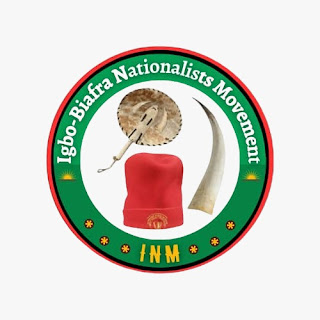IGBO BIAFRA NATIONALISTS
The Igbo-Biafra Nationalists/Indigenous People of Igbo
Nation for self-determination stand in support of the self-determination
aspirations of the Igbo Nation, advocating for the establishment of an Igbo
state in a confederal arrangement or an Igbo Republic, known as Ala-Igbo or the
Igbo State. We believe that the Igbo people have the right to determine their
own political, economic, and social destiny, based on the following reasons and
more:
The Igbo Nation has a strong case for self-determination,
and there are several compelling reasons to support their cause:
1.
Changing dynamics: The Biafra of 1967 to 1970 is
not the same as the Biafra of today. The geographical configuration has
changed, with the old eastern region now divided into the South East and South
South. Many states in the South South region are not willing to join in the
restoration of Biafra, making it impractical to revive the old eastern
region(Biafra) as it was in 1967. This necessitates a new approach that
recognizes the realities of the present. Put differently for ease of
comprehension, the division of the old eastern region into the South East and
South South regions has led to a shift in the geopolitical landscape. The
majority, if not all, of the states in the South South region are unwilling to
join the restoration of Biafra. This indicates that the Biafra of 1967-1970 is
no longer feasible in its original form. Recognizing this reality is crucial in
moving forward.
Note for the editors:
The Biafra of
1967-1970 was a product of a specific historical context that no longer
reflects the reality of today. The geographical landscape of the old eastern
region has changed, and the majority of the South-South states are unwilling to
participate in the restoration of Biafra. Recognizing this reality, it is
crucial to acknowledge the current context and move forward accordingly.
2.
Realistic initiative: Given the unwillingness of
other former component nations of Biafra to restore it, it is important to
consider a more realistic initiative. It would be unfair to force a Biafra
restoration that only the Igbo Nation desires. Instead, allowing each component
nation to pursue its own self-determination and political status can lead to
more meaningful progress and development for all. Insisting on the restoration
of the Biafra of 1967-1970 would only perpetuate a cycle of unproductive
debates and hinder progress.
Note for the editors:
Restoring the Biafra of 1967-1970 would require reverting to the
territorial boundaries of the old eastern region as they were in 1967. However,
the initiative lacks feasibility today, as it is only the Igbo Nation that is
willing to pursue this course of action. It is important to consider the
willingness and readiness of all involved parties when determining the path
forward.
3.
Self-determination for all: Embracing
self-determination for each component nation acknowledges their unique
aspirations and allows them to chart their own path towards political and
economic development. Granting autonomy or independence to the Igbo Nation, as
well as other nations within the former Biafra, respects their right to
determine their own future and fosters a sense of empowerment and
self-governance. What does this mean in realistic terms? It means separate
quests for self-determination. Allowing each component nation within the former
Biafra to pursue their separate quests for self-determination, political
status, and economic and social development respects their unique identities
and aspirations. Granting autonomy to each nation enables them to shape their own
future according to their specific needs and priorities.
Note for the editors: Each component nation should have the
freedom to pursue their own quest for self-determination, political status, and
economic and social development. Embracing diversity and respecting the unique
aspirations of each nation is crucial for fostering a harmonious and inclusive
society.
4.
Adjusted territory: If not all former component
nations are willing to restore Biafra, it is inevitable that the territory of
the first Biafra Republic or the old eastern region would be significantly
reduced. In that sense, the focus should shift towards accommodating the
desires of the willing partners and that will mean establishing a new alliance
with a more adjusted territorial scope.
If and when the willing partners among these nations form a new alliance
(subject to necessity), it can pave the way for a collaborative and cohesive
Biafra nation, while respecting the unique identities of each group. However,
the question is: how can that happen or be a reality where the only willing
partner among them is the Igbo Nation?
5.
Diverse Biafran identity: The Biafran identity
encompasses various ethnic groups, including Ijaw, Ibibio, Efik, and Anang,
alongside the Igbo people. Acknowledging the individual paces of these groups
in their pursuit of self-determination allows for a more inclusive approach.
What does this entails? It is essential to acknowledge that within the larger
Biafran identity, there are various distinct identities such as Ijaw Biafrans,
Ibibio Biafrans, Efik Biafrans, Anang Biafrans, and Igbo Biafrans. Each group
should be able to pursue their aspirations at their own pace, with willing
partners forming alliances, if any. By embracing this approach, we can foster
unity and collaboration based on shared goals and interests.
6.
Meeting the criteria for statehood: The
Montevideo criteria for statehood, including defined territory, permanent
population, effective government, and capacity to engage in international
relations, may pose challenges if the former component units of the old eastern
region do not unite. By focusing on the self-determination of individual
nations including the Igbo Nation, it
becomes more feasible to meet these criteria and establish stable and
recognized states. Put in another sense, the unwillingness of former component
units to join hands in restoring Biafra presents challenges in meeting the
basic requirements of statehood, such as defined territory, permanent
population, effective government, and capacity for international relations.
However, focusing on the self-determination of the Igbo Nation will enable the
fulfilment of these criteria, establishing a stable and recognized state.
7.
Marginalization and discrimination: The Igbo
Nation has faced historical marginalization and discrimination within Nigeria.
They have experienced state-sponsored economic and political marginalization,
underrepresentation, fewer states and local governments, and the lowest revenue
allocation among the regions in Nigeria. Igbo Nation Self-determination would
provide an opportunity to address these injustices and ensure equal rights and
representation for the Igbo people.
Note for the editors: Igbo Nation stands out as a target of
marginalization and underrepresentation within the larger Nigerian context.
State-sponsored apartheid policy of
economic and political marginalization, inadequate representation, an unequal
distribution of states and local governments, and lower revenue allocation
contribute to the need for the Igbo people to pursue self-determination for a
fair and just society within Nigeria or external self-determination outside and
without Nigeria.
8.
Regional disparities: The South East region,
predominantly inhabited by the Igbo people, has five states, while other regions
in Nigeria have six states each. This disparity highlights the need to address
the unequal distribution of resources and political representation. Internal
Self-determination would empower the Igbo Nation to advocate for fair and
equitable treatment within Nigeria and when all these fail, establish their own
political entity where they can determine their own affairs(democratic
secession and a variant of external self-determination).
9.
Individual component nations: The argument that
those who died in the pursuit of Biafra freedom did not die for specific
component nations but for Biafra as a whole is seriously flawed in the face of
the present developments. Let it be on record that before the adoption of
Biafra as a name for the for the old Eastern region’s sovereign status, the
individuals were natives of their respective component nations. We were first
Igbos, Ijaws, Ibibios,Anangs,Efiks, Igbos and so on.The unwillingness of other
component units, fueled by the Nigerian state, aims to prevent the self-determination
quest of Biafrans. Therefore, allowing individual component units to seek their
own political status, economic development, and social progress in mutual
respect and equality is the most viable solution.
Note for the editors: The argument that those who died in
the pursuit of Biafra freedom did not die for specific component nations but
for Biafra as a whole is not tenable. Before the adoption of Biafra as a name
for the sovereign status of the old eastern region, all Biafrans were first natives
of their individual component nations, such as the Igbos, Ijaws, Efiks, Anangs,
and others. However, the unwillingness of former component nations, fueled by
the Nigerian state, seeks to undermine the self-determination aspirations of
the Biafrans. The most viable solution is for individual component units to
pursue their political status, economic development, and social progress in
mutual respect and equality.
In conclusion, the Igbo Nation’s pursuit of
self-determination is grounded in the changing dynamics, the aspirations of
willing partners, the recognition of diverse identities within Biafra, and the
need for fair treatment and representation. The Igbo Nation self-determination
has its roots in the Nigeria/Biafra war, and ultimately draws its inspiration
from the Igbo Biafra Nationalism. By
embracing the quest for self-determination, the Igbo Nation can shape its own
future and address historical injustices while fostering a sense of empowerment
and unity.
Supporting the self-determination of the Igbo Nation is a
valid and justifiable cause. Recognizing the changing dynamics, embracing the
aspirations of willing partners, and addressing historical injustices will
contribute to a more inclusive and equitable society. By advocating for the
Igbo Nation’s self-determination, we promote the principles of fairness,
empowerment, and respect for diversity.




